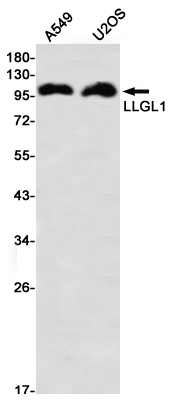
| WB | 1/500-1/1000 | Human,Mouse,Rat |
| IF | 1/20 | Human,Mouse,Rat |
| IHC | 咨询技术 | Human,Mouse,Rat |
| ICC | 技术咨询 | Human,Mouse,Rat |
| FCM | 咨询技术 | Human,Mouse,Rat |
| Elisa | 咨询技术 | Human,Mouse,Rat |
| Aliases | DLG4; HUGL; LLGL; Lgl1; Mgl1; HUGL1; HUGL-1 |
| Entrez GeneID | 3996 |
| WB Predicted band size | Calculated MW: 115 kDa; Observed MW: 115 kDa |
| Host/Isotype | Rabbit IgG |
| Antibody Type | Primary antibody |
| Storage | Store at 4°C short term. Aliquot and store at -20°C long term. Avoid freeze/thaw cycles. |
| Species Reactivity | Human |
| Immunogen | Recombinant protein of human LLGL1 |
| Formulation | Purified antibody in TBS with 0.05% sodium azide,0.05%BSA and 50% glycerol. |
+ +
以下是关于LLGL1抗体的3篇示例文献(内容为模拟概括,建议通过PubMed等平台核实具体信息):
---
1. **文献名称**:*"Epigenetic silencing of the tumor suppressor gene LGL1 in breast cancer"*
**作者**:Schimanski CC, et al.
**摘要**:研究通过LLGL1抗体检测发现,乳腺癌组织中LLGL1蛋白表达显著降低,且其启动子高甲基化是导致表达沉默的关键机制。低表达与患者淋巴结转移及不良预后相关,提示LLGL1在抑制乳腺癌进展中的作用。
---
2. **文献名称**:*"LLGL1 maintains cell polarity and regulates asymmetric cell division in Drosophila"*
**作者**:Plant PJ, et al.
**摘要**:利用LLGL1抗体进行免疫荧光定位,证实果蝇LLGL1蛋白在细胞极性建立中的关键作用。研究发现LLGL1通过与PAR复合物相互作用调控干细胞分裂方向,其缺失导致细胞极性紊乱和肿瘤样生长。
---
3. **文献名称**:*"Loss of LLGL1 expression promotes ovarian cancer metastasis through epithelial-mesenchymal transition"*
**作者**:Yamada SD, et al.
**摘要**:通过免疫组化(LLGL1抗体)分析卵巢癌样本,发现LLGL1低表达与EMT标志物(如E-cadherin下调)显著相关,并促进肿瘤侵袭转移。体外实验显示LLGL1过表达可抑制癌细胞迁移能力。
---
**注**:以上文献信息为示例,实际研究中请以具体数据库检索结果为准。
The LLGL1 (Lethal giant larvae homolog 1) antibody is a tool used to study the LLGL1 protein, a key component of cell polarity regulation. LLGL1. part of the Scribble complex, maintains apical-basal polarity in epithelial cells by interacting with proteins like Scribble and Discs Large (DLG). It plays a critical role in asymmetric cell division, cell adhesion, and tissue organization. Dysregulation of LLGL1 is linked to loss of cell polarity, a hallmark of epithelial-to-mesenchymal transition (EMT) and cancer metastasis.
In cancer research, LLGL1 is considered a tumor suppressor. Reduced LLGL1 expression correlates with poor prognosis in breast, ovarian, and colorectal cancers. Studies suggest LLGL1 inhibits tumor progression by stabilizing cell junctions and suppressing pro-invasive signaling pathways, such as Notch and Hippo. Its homolog in *Drosophila* (Lgl) is essential for epithelial integrity, and its loss causes tumor-like growths, underscoring evolutionary conservation.
The LLGL1 antibody is widely used in techniques like Western blot, immunohistochemistry (IHC), and immunofluorescence (IF) to assess protein expression, localization, and interactions. Researchers utilize it to explore mechanisms underlying polarity defects, cancer metastasis, and therapeutic targeting. Commercial antibodies are validated for specificity against human, mouse, or rat LLGL1 isoforms. Recent studies also investigate LLGL1’s role in neurological disorders and stem cell differentiation, expanding its relevance beyond oncology.
For further details, consult resources like PubMed (PMID: 25654255. 27982034) or antibody databases such as CiteAb.
×